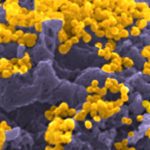Lien vers Pubmed [PMID] – 15924045
Ann Dermatol Venereol 2005 Mar;132(3):231-42
Autoimmune blistering skin diseases are characterized by the production of autoantibodies directed against adhesive structures of the skin. These organ specific autoimmune diseases included pemphigus in which autoantibodies target proteins of the desmosomal complex, and subepidermal autoimmune diseases characterized by autoantibodies directed against structural proteins of the dermoepidermal junction. Binding of autoantibodies to their targets induces a loss of adhesion between keratinocytes in pemphigus and alterations of the dermoepidermal junction in subepidermal autoimmune diseases. Progresses during the last twenty years had allowed the identification of target autoantigens and the characterization of their adhesive functions, a better understanding of the pathogenesis of these diseases and the development of new diagnostic tools.

